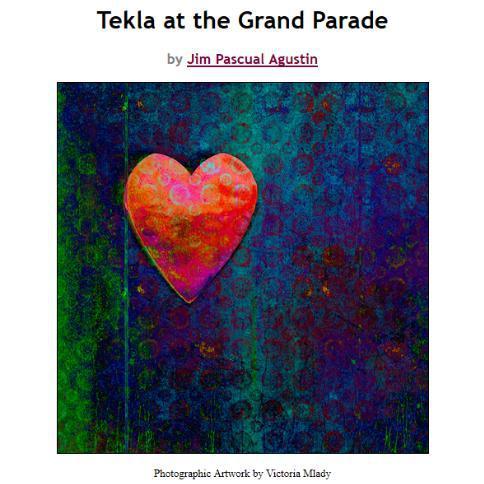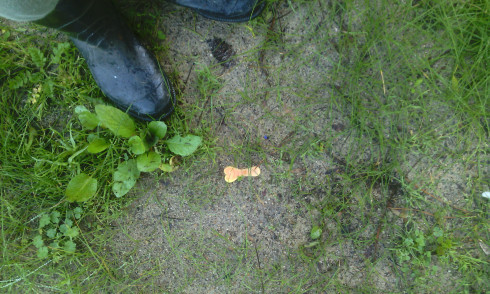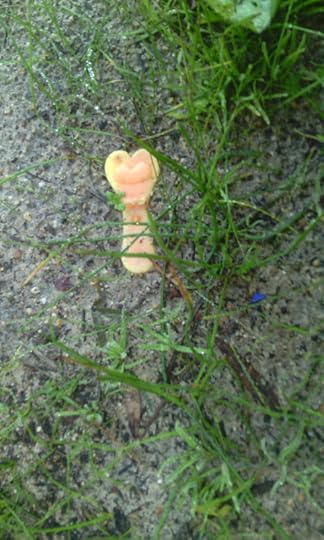Jim Pascual Agustin's Blog, page 23
August 17, 2016
More Wax than Human Remains
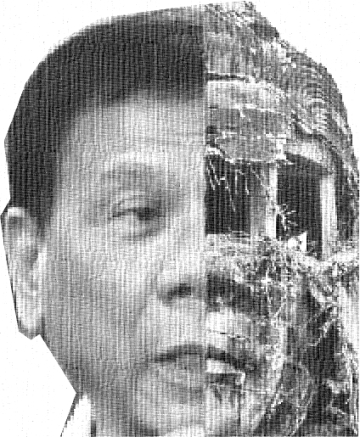
More Wax than Human Remains
The late dictator’s image rendered
in wax, displayed in a Quiapo-quality
glass box, is what his family would love
to drag down from the North
all the way to sweltering Manila.
Only those who have lived
through the darkness might ask:
How many candles could they carve
out of his non-human remains?
Will his greatest admirer simply
mow us down with curses and bullets,
deaf as he is to any protest?
-o-
Filed under: Asia, Filipino poetry, Jim Pascual Agustin, Life in a different world, Mga Tula / Poetry, Uncategorized Tagged: crypt, dictator, Duterte, Jim Pascual Agustin, Marcos dictatorship, Martial Law, More wax than human remains, Quiapo, wax


August 8, 2016
Mr. F. Sionil Jose, how does kissing the barrel of a gun make a country happy?
People often have a misconception about progress, about moving on, about how today and tomorrow will always be better than the already receding past. This misconception sometimes comes hand in hand when a leadership is replaced by what appears to be a far better one, one that proclaims a new order. When there is disillusionment toward the past, the future always seems brighter and brimming with hope. There is an accompanying euphoria, a deafening celebration even, as nearly everyone is overcome by a singular energy emanating from an apparently bold new power.
In the case of the recent Philippine elections, facts show that the new leader was not actually swept into power by a majority vote. A much bigger voting population did not choose him, which partly reflects a fault in the electoral system that may need tweaking. For the record, it must be recognized that Mr. Duterte’s presidency was not an outright landslide victory as is often parroted by foreign media correspondents.
Mr. F. Sionil Jose, you welcomed and bestowed such glowing praises to this new order. I cannot help but disagree with you. Allow me to say this outright: your metaphors may be simple and clear, but none of them can ever bring back the lives of those who have been killed and will continue to be murdered under Duterte’s watch. Not a single one. But they don’t matter, do they? Not in your view that fits nicely in the pocket of the new power who, on each and every occasion, has said human rights do not matter and that they are a hindrance to progress.
You cheered when Duterte criticized (as if he were the first to do so) the Catholic Church – an institution that arguably has many faults as well as merits, which its own followers and long-time critics know well enough. His first outbursts made mythical were but toilet-related.
You call him an Indio or a commoner (because of his looks perhaps, or his way of speaking?), yet he is among the elite – bank accounts, if ever they are revealed, or funding during his campaign should clarify that. His reign in Davao City, infamous for the death squads of recent memory, is now securely extended in the hands of his children. Do tell us, Mr. F. Sionil Jose, what this amounts to.
Your statement on the country’s free media completely disregards the fact that the Philippines remains one of the most dangerous places in the world for journalists. Surely any PEN member would know this. Those who fear exposure begin by branding the media as irresponsible and arrogant. Then they find other excuses such as allegations of being linked to some illegal activity. Not far down the line, the dark barrel of a gun.
The phrase “collateral damage” was coined by the CIA, as I’m pretty sure you are familiar with. It is nothing more than a lame excuse for murder that may as well sound like this: “We did not mean to kill the innocent, they were just caught in the crossfire. Sorry, sort of. Thank you for your understanding, your sacrifice.” Say that to the family of a victim and see how they react, I dare you. I’ll deliver you right to their doorstep.
That word, sacrifice, you invoke more than once, like a prayer. True sacrifice involves choosing to perform something that would normally be resisted. It involves giving up one’s own freedom in a way, with a complete understanding of the weight of that decision. But your idea of sacrifice here brings to mind a master telling its slave to choose either to be thrown into the fiery chasm of a volcano or to be fed to a wild beast.
There are far too many disturbing points in your article, but all of them boil down to what you said in your opening paragraph. You seem to have missed the very core of EDSA 1986, that momentous time in our country. The whole world was astounded when Filipinos from all levels of society – your belittled poor and the “privileged” and everyone else in between – came together and silenced the destructive power of guns. People knew the fragility of flesh yet they faced the brutality of the regime, believing their actions will awaken the inherent sense of humanity among the armed soldiers. Do you understand the true force in that?
Mr. F. Sionil Jose, you try to justify surrendering human rights as part of the sacrifice that must be made so that a promised better way of life should come to fruition. I guess you mean only for the survivors, as the victims are of little value. The greater good, the bigger picture, that promise which, in Duterte’s twisted logic and in your claimed revolution, means bloodshed rising like a storm surge.
Although there are many hopeful plans by the Duterte government, these are in deep conflict with the essence of nation building which treasures each and every citizen, including those who may seem to be a lost cause. In passing, you mention the case of Venezuela as a warning without recognizing how the people of that country continue to fend off the imperialist moves of your benefactors. It may do you some good to read other views of what has happened in that country.
Our very constitution states in many ways: each human life is precious and must be respected.
Human rights, Mr. F. Sionil Jose, cannot be set aside in this country of ours precisely because of its experience with dictatorship. Martial Law was a time when those who knew how to please certain masters were certain to benefit, while those who showed the slightest opposition due to their moral convictions were dealt with in various and devious ways. The violations began with so-called evils of society – the alleged criminals or drug lords – then moved on to student activists, the free media, then anyone else perceived to be opposed to the regime, or, for that matter, anyone who fell on the wrong side of a petty official or his goons. Investigations were rare, if at all. Everything and everyone was swept under the carpet. It was the New Society. Remember?
Similar events are taking place in this country. You do not just condone these, you sit up and applaud as people are silenced forever. It is so close to Martial Law, what with all the dead bodies turning up, except for two main differences: the dead are left to be seen and those who elected Mr Duterte (and horrifyingly even those who did not) see progress.
You and Mr Duterte, along with numerous others who these days clamor for more blood, need to read, at the very least, the UN Declaration on Human Rights. If it is too difficult to comprehend properly, I am sure there are individuals who would sacrifice their time to enlighten you.
The barrel of a gun seeks to plant fear in everyone’s minds. Not reason, not communication, not healing, not understanding, and definitely not the building of a nation. Every person becomes a possible target, at the mercy of the most petty killer.
This president sees no value in human rights. His response has repeatedly been “I really don’t care.” Where do we turn when we hear the howling of a hollow heart?
Being human means more than having gleaming new bridges of steel connecting islands, or a network of train lines that covers cities and provinces, or orderly streets swept clear of informal vendors, or emergency numbers for those in need of immediate assistance, or even silence in the dead of night.
Mr F. Sionil Jose, as one writer to another, we know we all seek to write imagined lives as if they were real to us. If we cannot believe them, their possibility of existence, then how can we convince a single reader? In order to achieve this, we seek the heart of a character, the world s/he sees, the voice of one that might be. We may even be thought of as mad as we laugh or grieve with them, as if they were real. I shouldn’t have to tell you to imagine what real people are beyond the page, yet I feel I need to after reading your article where you’ve discarded with a sense of humanity.
Being human means trying your very best to see each person as possessing the same rights you hold dear. It means looking at the details of a life with value, a life as if your own. To be human is to see the frailty as well as the possibility in each person that should never be so quickly extinguished and disregarded, silenced by a bullet and a sign on a piece of cardboard.
This one man’s order that brands anyone (for whatever reason) as unwelcome in the new order, and thus deserving a swift end, is a violation of this right, this life.
With each bullet, each drop of blood, monsters come to life, painted with the crudest brush. Let us not be led back to the days of scrawling on caves.
-o-
PLEASE CONSIDER READING AND SIGNING THIS PETITION
PHOTO THAT GAVE THE KILLINGS A HUMAN FACE
Filed under: Asia, Filipino-South African, Fragments and Moments, Imperialism, Influences, Jim Pascual Agustin, Latin America, Life in a different world, politics, Uncategorized Tagged: Duterte, extra judicial killings, F. Sionil Jose, Jim Pascual Agustin, Philippines, protest


August 3, 2016
Sympathy for the Doomed – NoiseMedium publishes my winning poem, “To be an Orc”
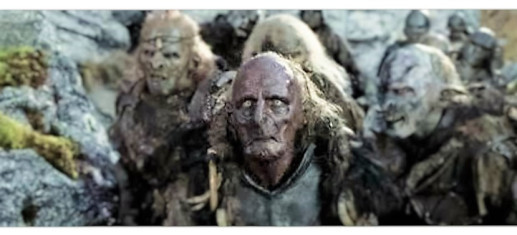
A frame from “The Lord of the Rings” movie directed by Peter Jackson
This isn’t a sob story. I hate those. This is just a statement of facts. Almost.
No one ever read to me as a kid. The image of a child being tucked in bed with a night lamp close by and his/her parent(s) reading while the child looks up in enchantment was entirely foreign. My overworked parents were government employees – my mother was a teacher who was given too many students and after-school tasks to handle (including possibly risking her life during turbulent elections as part of the underpaid voting staff), and my father was a soldier who got called and posted somewhere during the years of Martial Law. My grandmother spoke a local dialect I didn’t know well enough to understand.
I didn’t even have a single children’s book to read on my own and fall asleep with, let alone what others might call a family library. Aside from school textbooks and local comic books that I saved up my weekly allowance for, I read nothing else. Oh, yes, my parents eventually put aside some of their earnings so they could buy me and my three sisters the 1981 edition (I think) of the Encyclopedia Britannica. (That huge set was destroyed by the floods of Ondoy in 2009, along with my small collection of books from university days.)
With the state-controlled media swamped by US media, I was only exposed to the generally loud and garish images of Looney Tunes and Disney. And then, for a time until the dictator Ferdinand Marcos shut them all down, the robots of Japanese anime series (a separate post on that one day).
So elves and fairies I knew were fluffy and cute thanks to Disney. Dwarves were adorable as they sang and whistled happy melodies while digging.
Orcs I didn’t read about until high school when my closest friend, Arman, introduced me to the world of Tolkien. He got me to take up membership at the British Council in Manila. There I devoured all that I could get my hands on, not just of Middle Earth (illustrated accompanying books included), but of authors I’d never heard of. It was there that I “met” Craig Raine and the late Elizabeth Bartlett (whom I really, really “met” by traditional mail – I received letters and books from her!).
I was both awed and disappointed with Peter Jackson’s adaptation of The Lord of the Rings years later. Oddly, I felt some sympathy for the orcs. Or rather, the actors who portrayed the orcs.
On 5 August 2014 (I enter dates when I start and finish a piece), I began a poem called “To be an Orc.” It has taken a long time for it to find a home. So when I was informed it was not only seeing publication for the first time, but on top of that it had actually won something, my first reaction was “What? Am I dreaming?”
I wish to thank NoiseMedium for finding my work worthwhile of publication. I hope you all visit their amazing website and read “To be an Orc” as well as all else that they have lovingly gathered there.
An aside. I wish to express my strongest objection to the extra-judicial killings supported by the new leadership of my country of birth, the Philippines. I urge you to read, sign, and share THIS PETITION with all your friends, family, social media circle, as well as anyone who you think might might help put out this urgent matter. Thank you.
Filed under: Filipino poetry, Filipino-South African, Jim Pascual Agustin, Uncategorized Tagged: Duterte, Filipino poetry in English, Jim Pascual Agustin, murders, NoiseMedium, poetry, To be an Orc, war on drugs


August 2, 2016
Last Words, and a photograph that says something else
A few days ago I was sweeping the leaves that had fallen all over the front of the house. There were so many of them that I had gathered nearly ten heaps about a foot high each. They were mostly brown, but also green ones and yellow ones, and shades in between. I couldn’t count how many there were really unless I picked them up and separated each one at a time. I tried to take a few photos, perhaps just to remind me that I did some work in the yard that day. Then one photo came out completely different from the others. It came out red.

These days the people in my country of birth wake up to news of those summarily executed and dumped in broad daylight. It is a nightmare existence. The rising number of victims continues because of words. Yes, words from the newly-elected president who won by plurality vote (meaning not a majority, but by less than 40% of the voting population in this case).
Words of hatred and destruction. Words that seek to erase the humanity in each person, in both victims and perpetrators. Words that carry a blindness that quickly spreads. And so with words I share this warning.
-o-
Last Words
Being exposed to the elements,
the point of this spear
has gone
almost the way
of dust.
It has no memory
of skin and blood.
It has no memory
who held it first, last.
It is just one of many,
an echo of defeat
or conquest.
All who wish to keep
their grip on the rest
will surrender to the weaver
of myths and songs.
The last words
will never flow
from the lips of an emperor.
—from Alien to Any Skin (UST Publishing House, 2011)
Filed under: Uncategorized Tagged: Alien to Any Skin, Duterte war on drugs, EJK, extrajudicial killings, human rights violations, Jim Pascual Agustin, Last Words, Philippines, poetry, terror, war on drugs


August 1, 2016
Eclectica Magazine publishes “Tekla at the Grand Parade”
I have far too many things on my mind these days, more troubles than joys. But one poem just got published by Eclectica Magazine, and so I’ll take that as a blessing.
Thank you to the kind editors for giving space for my work.
Please read the poem “Tekla at the Grand Parade” and the others featured by this long-running online journal.
Filed under: Filipino poetry, Filipino-South African, Jim Pascual Agustin, Mga Tula / Poetry, poetry, Uncategorized Tagged: Eclectica Magazine, Filipino poetry, Filipino poetry in English, Jim Pascual Agustin, Philippines, poetry, South Africa, Tekla at the Grand Parade


June 21, 2016
Maybe a different angle?
Sometimes one is not quite sure what one is looking at. But even a closer look doesn’t seem to help.
Filed under: Uncategorized


June 19, 2016
I don’t need a greeting card for my dad
There are far too many celebrations used to justify spending on things one doesn’t need or really want, thanks to consumerism.
I don’t like celebrating Father’s Day. Not since my father passed away. Come to think of it, I don’t think I ever did anyway even when he was around. It just wasn’t part of any family tradition, I guess. One can argue making such a day special can be seen as superficial. Each day should be celebrated with the ones we love, for, as with everything, all this is temporary. We’re all just passing. Yeah, others have said that before and probably in better ways.
The youth are often uninterested in what the generation before them lived through – what made them happy or sad, what they wished before they ended up with a particular job that wasn’t their first choice, what their favorite shirt was, and other details that seem inconsequential.
I only know a few things about my dad before I was born. He was a good soccer player and was offered a scholarship to keep playing. He had to refuse it so he could work and support his brothers and sisters. He joined the military. Imagine if he had chosen just for himself?
He passed away when I was on the other side of the world. My sisters put the cellphone close to him as he muttered various sounds no one could make out. I doubt he knew it was me on the other end.
I was with my wife and our twin daughters who were too small to have any memory of that day. We were at a function organized by parents of twins and multiples. There were farm animals in the stalls being petted by laughing children not far away from where we were sitting in the grass.
He never got to read the following poem (which I may have shared here or elsewhere before).
Paper Skin, Bone of Bamboo
These were all we needed:
an old pair of scissors,
two pieces of sturdy
but pliant bamboo, split
to the width of a finger
the span of my young arms,
newspapers, the gray skin
rubbing off on my palms,
a fistful of cold rice
to glue everything together.
Last was the longest string
I could steal from my mother
as she lay in restless sleep.
Then there had to be time.
All these things grew useless
without time. They waited
to be gathered, to be touched,
pieced together with patience.
They waited for father.
Those newspapers could have told me
scraps of stories, something
about his absences, nights
and days on end. Curfews, arrests,
insurgents, offensives,
puppet masters, empires.
Back then words mattered less
to me. All I wanted to see
was that kite defying claws
of TV aerials and rusty roofs,
the grasp of remaining trees.
From both our hands
that kite took off and saw
the sprawl of lives made intimate
by a common silence and struggle.
It took on the wind and sang.
Blurred all words on its skin.
Stillness in between mad search
for balance became its dance
to its very end.
Although those rare afternoons
never lasted long enough,
that kite was relentless, fierce
in its defiance of wind
and ground, everything
that dared to take away
all that fragility,
all that majesty.
-o-
from Alien to Any Skin, University of Santo Tomas Publishing House, 2011.
Filed under: Alien to Any Skin, Capitalism's greed, Filipino poetry, Filipino-South African, Fragments and Moments, Jim Pascual Agustin, Mga Tula / Poetry, Uncategorized


May 27, 2016
Burying a Dictator
One thing that seems to have forced even his own supporters to declare disagreement with him even this early has to do with the remains of the dictator, Ferdinand Marcos. The incoming president apparently sees him as worthy of being buried at the Heroes’ Cemetery. The public – perhaps more aware of that dark part of the country’s history – has started various campaigns to fight this utter disrespect for the countless victims of Martial Law. One of the campaigns is on Change.org. Here is the LINK . Please consider signing it and then sharing the petition link.
In showing my support, I am posting this poem which appeared in my book ALIEN TO ANY SKIN (University of Santo Tomas Publishing House, 2011). My poem is nothing compared to what the people of the Philippines suffered under the rule of the dictator, his family, and various cronies.
Tracks on Grasslands
It begins with that one step. A boot
on the slenderest blade
of grass. The faintest
crunch of bright green veins
nearly invisible to your eye.
But it happens. That breaking.
It happens again and again
as you move on, forcing down
other blades of grass,
leaving your tracks,
making a path of near
silent destruction
to somewhere
you think is yours
to claim.
And when you encounter
thicker grass that dare
to keep you out,
you make them sing
with that sharpened edge.
You do this in the dark.
You do this mostly in the dark.
October 2007
-o-
Filed under: Alien to Any Skin, Filipino poetry, Filipino-South African, Fragments and Moments, Influences, politics, Uncategorized Tagged: Alien to Any Skin, dictator, Ferdinand Marcos, Filipino poetry in English, Jim Pascual Agustin, Martial Law, terrorism, UST Publishing House, violence


May 10, 2016
The tap was left running – or “Oh, I got featured on the Ploughshares blog!”
My country of birth just had major national elections. I wasn’t there to participate, to feel all the excitement, the dread, the many and varied hopes that gushed out of people I know and many I will never meet. So it feels almost selfish that I share this bit of personal news. Someone felt my work was worthy of being read and gave me some room to express myself.
I don’t really know what to say most times when asked highly personal questions. Nichole L. Reber threw some really tough ones and I hope I didn’t sound like a tap left running until the bucket overflowed. Please visit the Ploughshares blog and maybe try to leave a message here or there if you have any feedback – complaints, curses, blessings, or whatever reaction you may have.
Mostly I really just want to thank each reader who has given my work a chance. Maraming salalamat, sa inyong lahat. Nichole, I hope I didn’t disappoint with my long-winded answers.
HERE IS THE LINK TO THE PLOUGHSHARES BLOG

Filed under: A Thousand Eyes, Africa, Alien to Any Skin, Asia, Baha-bahagdang Karupukan, Filipino poetry, Filipino-South African, Fragments and Moments, Jim Pascual Agustin, Kalmot ng Pusa sa Tagiliran, Life in a different world, Literary News & Articles, Mga Tula / Poetry, poetry, Sanga sa Basang Lupa, Sound Before Water, Uncategorized


April 5, 2016
Despicable Zuma and his Parliaminions
Zuma’s minions in Parliament predictably used their numbers to lie with their leader. In unison they pretended that the Constitutional Court of South Africa had not condemned in no uncertain terms how Zuma broke his oath of office. He feigned an apology fittingly on April Fool’s Day, at least. He may also have showered. But his stench continues to suffocate the once great South African skies.
Time for organized and peaceful protests. I’m sharpening my pen.
Filed under: Uncategorized



